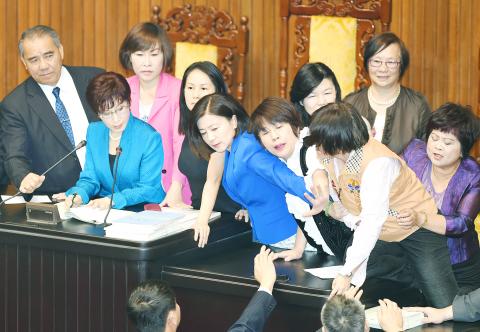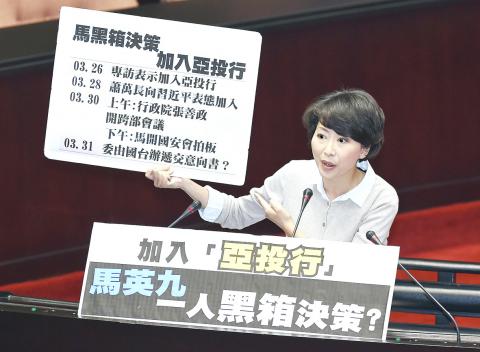Taiwan would rather not take part in China’s proposed Asian Infrastructure Investment Bank (AIIB) if it is not treated with dignity and equality, Premier Mao Chi-kuo (毛治國) said yesterday.
Mao made the remarks during a question-and-answer session on the floor of the Legislative Yuan in Taipei as he was peppered with questions about possible arrangements for the nation’s participation in the nascent development bank.
Yesterday was the deadline set by China to apply to become a founding member of the Beijing-based bank.

Photo: Liao Chen-huei, Taipei Times
The government submitted the nation’s letter of intent through the cross-strait communication channel between the Mainland Affairs Council and the Taiwan Affairs Office (TAO) of China’s State Council in Beijing.
Mao told lawmakers that the letter was addressed to the AIIB by Minister of Finance Chang Sheng-ford (張盛和), and the Mainland Affairs Council simply acted as the “messenger.”
Several Democratic Progressive Party (DPP) and Taiwan Solidarity Union (TSU) lawmakers criticized what they said was a hasty decision by the government to apply to join the AIIB and to make the application through the Taiwan Affairs Office.

Photo: Liao Chen-huei, Taipei Times
The decision to apply was announced after President Ma Ying-jeou (馬英九) held a national security meeting on Monday, one week after he asked former vice president Vincent Siew (蕭萬長) to convey Taiwan’s intent to join when he met Chinese President Xi Jinping (習近平) at the Boao forum on Saturday.
Ma revealed his instructions to Siew in an interview on Friday last week. Prior to that, Mao and other government officials had repeatedly said that the government would assess the possibility of joining the AIIB if it received an invitation from China.
However, China yesterday signaled that Taiwan might not be allowed to join the new bank.
“As for Taiwan joining [the AIIB], we maintain that we should avoid the ‘two Chinas’ and ‘one China, one Taiwan’ situation,” Chinese Ministry of Foreign Affairs spokeswoman Hua Chunying (華春瑩) told a regular briefing in Beijing, without commenting further.
Meanwhile, several scuffles broke out on the legislative floor as between 20 and 30 Chinese Nationalist Party (KMT) lawmakers pulled two TSU lawmakers away from the legislative podium as they tried to boycott the plenary meeting to protest against the government’s handling of the AIIB matter and China’s new M503 flight route.
The two TSU lawmakers spent several hours shouting that Ma had sold out the nation’s interests as the proceedings began, while two DPP lawmakers occupied the seat to prevent Mao from taking the podium, forcing Mainland Affairs Council Minister Andrew Hsia (夏立言) to take part in a cross-party negotiation that ended up lasting several hours.
DPP Legislator Chen Chi-mai (陳其邁) told a press conference that submitting an application to join the proposed bank through the TAO was like Hong Kong handing in its application to the Liaison Office of the Central People’s Government in Hong Kong.
Taiwan’s participation in the AIIB was “international” in nature, but Ma treated it as a “cross-strait” issue under the “one China” framework, Chen said.
A consensus was finally reached among lawmakers and Hsia on how to deliver the AIIB application: “The Executive Yuan should apply to join the AIIB on condition that the nation’s dignity is ensured, with the letter of intent to be delivered to the preparatory office of the AIIB to ensure the nation’s best interests are safeguarded and is not denigrated. Government agencies should conduct comprehensive assessments and present a report, including arrangements for the nation’s participation, to the legislature’s Financial Committee to allow for legislative oversight.”
Once Mao was finally able to take lawmakers’ questions, he defended the decision to go through the TAO.
“We have no other channel [with China] except the formal channel between the Mainland Affairs Council and Taiwan Affairs Office. This is the only one we have,” Mao said after DPP Legislator Pasuya Yao (姚文智) asked him why the then-Sports Affairs Council had been able to directly communicate with China about the 2008 Beijing Olympics.
Much of the criticism from DPP and the TSU lawmakers focused on how the government arrived at the decision to apply to join the bank.
TSU Legislator Yeh Chin-ling (葉津鈴) told Mao the TSU did not oppose Taiwan being part of the AIIB if the principles of equality and dignity are upheld.
In a post on Facebook, DPP Chairperson Tsai Ing-wen (蔡英文) said Taiwan would not stay outside of regional organizations, but the nation’s interests cannot be ensured without a thorough and unbiased assessment, democratic discussion, legislative supervision, and transparent and cautious decisionmaking.
Minister of Foreign Affairs David Lin (林永樂) said issues related to the AIIB would be dealt with through negotiations, citing the models in which Taiwan was admitted to the WTO and APEC.
Asked for comment, American Institute in Taiwan spokesperson Mark Zimmer said that the US respects the right of each economy to make its own decisions.
“We do believe that any economy participating in the AIIB should insist upon the same core standards that the international community has established in the existing multilateral development banks, especially governance and environmental and social safeguards,” Zimmer said.
Additional reporting by AFP

The US government has signed defense cooperation agreements with Japan and the Philippines to boost the deterrence capabilities of countries in the first island chain, a report by the National Security Bureau (NSB) showed. The main countries on the first island chain include the two nations and Taiwan. The bureau is to present the report at a meeting of the legislature’s Foreign Affairs and National Defense Committee tomorrow. The US military has deployed Typhon missile systems to Japan’s Yamaguchi Prefecture and Zambales province in the Philippines during their joint military exercises. It has also installed NMESIS anti-ship systems in Japan’s Okinawa

‘WIN-WIN’: The Philippines, and central and eastern European countries are important potential drone cooperation partners, Minister of Foreign Affairs Lin Chia-lung said Minister of Foreign Affairs Lin Chia-lung (林佳龍) in an interview published yesterday confirmed that there are joint ventures between Taiwan and Poland in the drone industry. Lin made the remark in an exclusive interview with the Chinese-language Liberty Times (the Taipei Times’ sister paper). The government-backed Taiwan Excellence Drone International Business Opportunities Alliance and the Polish Chamber of Unmanned Systems on Wednesday last week signed a memorandum of understanding in Poland to develop a “non-China” supply chain for drones and work together on key technologies. Asked if Taiwan prioritized Poland among central and eastern European countries in drone collaboration, Lin

NO CONFIDENCE MOTION? The premier said that being toppled by the legislature for defending the Constitution would be a democratic badge of honor for him Premier Cho Jung-tai (卓榮泰) yesterday announced that the Cabinet would not countersign the amendments to the local revenue-sharing law passed by the Legislative Yuan last month. Cho said the decision not to countersign the amendments to the Act Governing the Allocation of Government Revenues and Expenditures (財政收支劃分法) was made in accordance with the Constitution. “The decision aims to safeguard our Constitution,” he said. The Constitution stipulates the president shall, in accordance with law, promulgate laws and issue mandates with the countersignature of the head of the Executive Yuan, or with the countersignatures of both the head of the Executive Yuan and ministers or

CABINET APPROVAL: People seeking assisted reproduction must be assessed to determine whether they would be adequate parents, the planned changes say Proposed amendments to the Assisted Reproduction Act (人工生殖法) advanced yesterday by the Executive Yuan would grant married lesbian couples and single women access to legal assisted reproductive services. The proposed revisions are “based on the fundamental principle of respecting women’s reproductive autonomy,” Cabinet spokesperson Michelle Lee (李慧芝) quoted Vice Premier Cheng Li-chiun (鄭麗君), who presided over a Cabinet meeting earlier yesterday, as saying at the briefing. The draft amendment would be submitted to the legislature for review. The Ministry of Health and Welfare, which proposed the amendments, said that experts on children’s rights, gender equality, law and medicine attended cross-disciplinary meetings, adding that